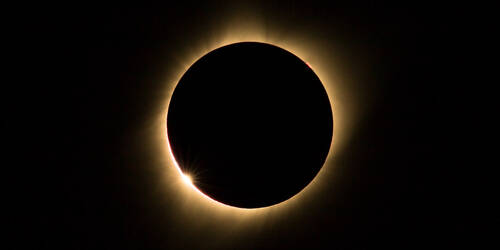A moment of darkness
04/05/2024 08:10:22 AM
Rabbi Boris Dolin
| Author | |
| Date Added | |
| Automatically create summary | |
| Summary |

God said, ‘Let there be luminaries in the firmament of the heaven to separate between the day and the night; and they shall serve as signs…’ -Genesis 1:14
Months ago when I first heard that there was going to be a total eclipse in Montreal, I made sure to schedule a day off from work. There was no way that I was going to miss an opportunity to see this incredible celestial event, something which happens truly once in a lifetime. And as a rabbi, I was happy to step out of the comfortable walls of the synagogue, ready to do as my ancestors did and “look up to the heavens” to admire the mysteries beyond me.
I have read about other eclipses throughout history and their ways that they have been interpreted by the people who see them. Some saw the darkening sky as a sign of the end of days, or a message from the gods. Others saw the eclipse as a blessing of good luck or simply as a reminder to pray. Yet what holds all of these beliefs together is that they force people to look up, to take a break from their normal lives and spend a few moments fully immersed in a mystery beyond them. I can imagine these people looking up to the heavens (unfortunately without eclipse glasses) wondering how such strange events could happen, and trying to figure out what message the Sun and Moon must be sending.
Eclipses in Hebrew are called likui, a “defect,” and like so many other cultures, for much of history Jews saw them as a bad sign for the world. The basic belief was that God was taking away the Sun for a short period of time, using the darkness as a warning for humanity to shape up. Yet as science helped people understand a bit more of the astronomical reasons for the event, eclipses became a more of a positive reminder of the mysteries of the cosmos and the powers that lie beyond us.
And thankfully Judaism left plenty of other times where people are asked to get out of their homes and places of worship and look up. Even though the exact time is now available on the internet and in our Chabad and funeral home calendars, we know the time of Havdalah, the exact moment that Shabbat ends, by going outside and seeing three stars. There is a monthly spiritual prayer event called kiddush levana, the “Blessing of the Moon” that asks us to go outside to pray and sing, and like hippies at a midnight dance festival, jump up and down as we try to reach the heavens. Our calendar is organized by the interaction of the moon and the sun, and once a month, usually in the comfort of a synagogue, we have a special blessing, Birkat Ha Chodesh, announcing the new month and celebrating the New Moon.
Even with all of these celestial reminders, these days it's all too easy to just look on the calendar and say “The moon is full,” or “It’s a new month” and move on with our days. But something as big as an eclipse can push us out of our slumber and remind us to take a break to get out and look up. There is no way that we can feel the power of such a rare event looking at a computer screen. And standing outside in the fresh air, surrounded by the trees, the sky, the light and dark, and possibly other people, we are reminded that we are not alone. Even more, we are reminded that even in our complicated and busy life, in a world filled with all too much pain and darkness, sometimes a bit of momentary darkness can give us hope.
On Monday, I hope the weather will be clear when eclipse time comes. I will be standing outside looking up at the heavens, admiring the mystery that the sky will provide. The sky will darken, the quiet wind will blow, and for a precious few moments we will be reminded that there is something beyond us. The Sun, the Moon and the stars are always there, quietly moving on their path and which, for a blessed few moments, sometimes make the sky go dark. Who knows? Maybe this time the eclipse will give us a message we all need to see.
Congregation Dorshei Emet - 18 Cleve Rd., Hampstead, QC, H3X 1A6 - 514-486-9400
Home - About Us - Contact - Disclaimer
Privacy Settings | Privacy Policy | Member Terms
©2025 All rights reserved. Find out more about ShulCloud



